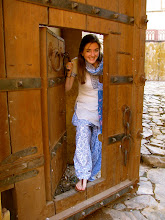As many of you know, this particular IJM office seeks justice on behalf of individuals in bonded labour. "Bonded labour" is just a technical term for slavery.
My office is an impressive team--hardworking investigators who gather evidence against facilities using slave labour and plan raids in conjunction with government officials; passionate social workers who provide aftercare and training for released victims; dedicated lawyers who fight hard to bring perpetrators of these evil crimes to justice; and strong administration and communication staff who share all of these stories. It's a busy place, with everyone doing a bit of everything. There is much laughter and encouragement despite daily frustrations and setbacks, hope in spite of deeply ingrained systems of injustice. IJM's work is straightforward: to end slavery.
My responsibilities are varied, but one of the tasks I have enjoyed most is reading through past cases and writing a case narrative, tracing the story from the victims' statements given during preliminary investigations through the details of the raid to the complex stages of pre-trial. I have been educated and heartbroken by the victims' desperate pleas for rescue as well as the legal process nearly strangled by so much red tape. Sadly, many of the stories start the same way: a family member is sick and needs to go to the hospital; a mud hut is destroyed by rain and the home needs repairs. So the husband takes out a loan from the owner of a rice mill or brick kiln or other facility where his entire family will be "bonded" until the advance is paid back. However, the owner does not pay minimum wage and the workers are not allowed to find work elsewhere--they are trapped in a state of extreme poverty with no way to ever earn enough to pay back an increasingly unfair loan. This system is illegal, thanks to the Bonded Labour Act of 1976. But this law is largely unregulated and slavery persists as an acceptable way of doing business. The National Institute for Human Rights, based in Bangalore, estimates that there are as many as 64 million slaves in South Asia today.
The numbers are big. The challenges are immense. Individual slaves must be rescued and restored one by one, a process which requires precise planning and then committed care. The perpetrators of these crimes must be brought to justice, a painstaking process of educating government officials, police and judges about the very laws they are appointed and elected to uphold. And the society which accepts this unjust way of life must be transformed.
In spite of these broken legal systems and generations of social apathy, I am constantly amazed and humbled by the resilience of my co-workers at IJM--modern day abolitionists. That's strong language, but these are strong people.

4 comments:
As I've told you before Miss Tierney, I am in awe of your strength, determination and faith. I pray for continued blessings over you and your work. Continue to soak everything in and I know when you return we will all be better off for you having been there.
Stay strong and well
Jeanne
one more thing
I ditto Anna
The sari's are beautiful !
Wow, Tierney that is intense work. It is so amazing that you get to take part in God's work in India. I am praying for you and love you soo much!!! Thanks for taking the time to write this down, it is so fun for me to read:).
Thanks for sharing that T, it's amazing and challenging and heart breaking. I'm so proud of you and praying for you and the work you guys are doing.
Post a Comment